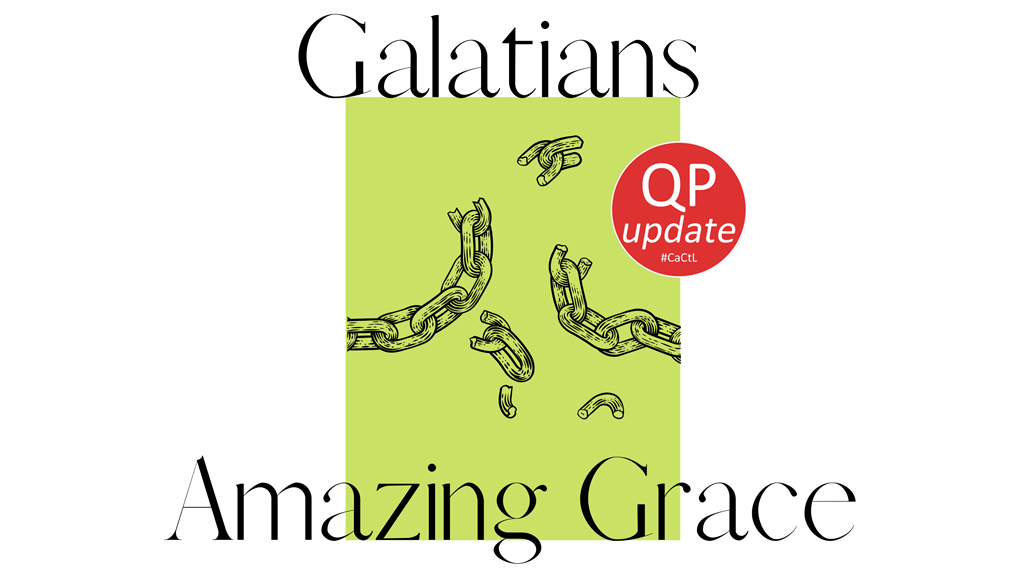June 2019 saw a historic event occur on the pyramid stage at the Glastonbury Festival. The rapper Stormzy became the first black solo British headliner at the iconic festival. Central to his performance was his hit song “Blinded by your Grace”
The excited crowd of festivalgoers joined in with the words:
“Lord I’ve been broken
Although I’m not worthy
You fixed me, now I’m blinded
By your grace
You came and saved me.”
Grace is the life-changing power of God doing for us what we cannot do for ourselves.
This is the reality that erupted in the lives of the first Christians like those we have been reading about recently in Paul’s letter to the Galatians. Here in southwest Turkey, Jews and Greeks, slaves and free, women and men were encountering an outpouring of God’s blessing and power which belied their social standing or cultural heritage. They were experiencing what Mike Yaconelli describes as the outrageous grace of God:
The grace of God is dangerous. It’s lavish, excessive, outrageous, and scandalous. God’s grace is ridiculously inclusive. Apparently, God doesn’t care who He loves. He is not very careful about the people He calls His friends or the people He calls His Church.
New Testament scholar John Barclay tells us that in Roman society it was common practice to ration out gifts strategically and discriminately to those who were regarded as valuable or important. He points out that the grace of God in Christ flips this on its head. God gives, the New Testament says, not because we are worthy but in order to make us worthy.
Martin Luther the great reformer said:
“Sinners are attractive to God because they are loved; they are not loved because they are attractive …This is the love of the cross.
God’s grace confers value upon us.
We are continually reminded that we live in an age critically short of self-esteem and worth. The numbers of people suffering anxiety, self-doubt depression, and struggling to find a foundation on which to build identity are epidemic. No doubt these conditions surface in multiple ways: sleep disorders, compulsive behaviours, self-harm, and more. Undoubtedly, they are intensified by the high expectations of self-image, body shape, celebrity, and achievement that are portrayed in our daily diet of social media.
Brene Brown famously said “let go of who you think you should be and embrace who you truly are.” (Subtitle of “Gifts of Imperfection). Sadly, that does not help as John Barclay points out
“if “who you are” crumbles under your own embrace as happens for many people today. If that embrace does not come from outside ourselves and if it’s not completely authoritative and utterly secure we are left wishing ourselves into worth rather than knowing we have it.”
Identity, worth and psychological security require a secure base that is more than my own wishful thinking, no matter how strongly I hold it.
This is the glory of grace and the good news of the message of the gospel. There is nothing inherent in any of us worthy of God’s attention, and nothing in God’s giving that pays any regard to our personal achievement.
- I am not my social status
- I am not my educational qualification
- I am not my own estimation of myself
- I am most truly myself in the shadow of Christ’s gift of himself for me on the cross.
- I am who God says I am
Of course, it’s not always easy to sense this and stand on this. What we believe in our heads must move to our hearts. Paul’s hope is that our worth before God is reinforced by how we relate to one another. In Romans 12:10 he says
“Take the lead in showing honour to one another.”
Here is an encouragement to all of us to actively promote to one another the assurance of God’s acceptance and the worth that grace conveys. After all, it’s so hard to hear this for ourselves.
It seems to me that grace is a truth our societies and souls are desperate to know. I like to think that truth of it resonates deep within all human hearts and that is what made the 2019 Glastonbury crowd sing.
